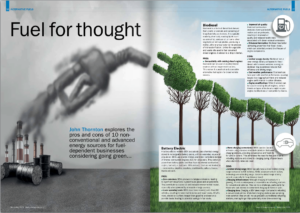The UK government’s proposed ban on the sale of new petrol and diesel cars has been postponed until 2035 – bringing the country in line with the European Union’s target.
Introduced in 2020, the ban had been set to come into force in 2030 after then-prime minister Boris Johnson had already moved the deadline up from 2040 to 2035.
Announcing the delay, British prime minister Rishi Sunak said that although an electric car is sold every 60 seconds in the UK, there are still significant hurdles to choosing one.
He cited high costs, practicality concerns from small businesses and a lack of nationwide charging infrastructure as the main reasons behind the delay.
The pushback forms part of an easing of green policies under a “new approach” by the Tory-led government designed to protect “hard-pressed British families” from “unacceptable costs“.
Delivering a speech from 10 Downing Street, Sunak said he is still committed to reaching net zero by 2050, but believes the transition can be done in a “fairer and better way”.
Explaining the decision to delay the introduction of the ban on the sale of new petrol and diesel cars by five years, the prime minister said this would give businesses “more time to prepare”.
He also said people would still be allowed to buy secondhand diesel and petrol cars after 2035 and this would align the UK’s approach with countries across Europe, Canada and many US states.
Should the UK government delay the introduction of a ban on the sale of new internal combustion engine cars from 2030 to 2035?
— City Transport & Traffic Innovation Magazine (@CiTTimagazine) September 20, 2023
Don’t use X? You can also take part in our reader poll on LinkedIn
The delay to the ban has been met with a mixed response from vehicle manufacturers, automotive trade associations, solution providers and transport/environment NGOs alike.
Lisa Brankin, Ford UK chair, said: “We need the policy focus trained on bolstering the electric vehicle market in the short term and supporting consumers while headwinds are strong: infrastructure remains immature, tariffs loom and cost-of-living is high.”
Meanwhile, NGOs including Transport & Environment, Campaign for Better Transport, and Greenpeace UK condemned the move as an “attack on industry, climate and consumers”.
In an open letter, the group warned: “The 2030 ban on the sale of new petrol and diesel vehicles, and the accompanying zero emissions vehicle mandate, is the biggest carbon cutting measure in the government’s Net Zero Strategy.
“The delay to 2035 blows a massive hole in any serious attempt to reach net zero emissions by 2050 and thanks to the legally binding nature of the target, emissions savings will need to be found elsewhere.”
Nick Woolley, CEO of ev.energy, also claimed that the delay will result in the UK releasing a minimum of 10 million additional metric tonnes of carbon into the atmosphere.
“Scrapping the 2030 target puts more money in the coffers of oil companies and increases costs for the motoring public.
“To decarbonise, we need to accelerate the transition everywhere, all at once – extending the life of fossil fuels in vehicles by five years is completely the wrong approach,” said Woolley.
“Yesterday the grid ran with a new green record, with only 14.5% of generation coming from gas, and we’ll soon see gas disappear completely and the grid becoming 100% green,” continued Woolley. “So why are we not seizing this opportunity to fuel transport with green electrons?
“Powering EVs with wind and solar is also cheap, saving drivers hundreds of pounds a year, and if employed at scale, would help save an additional two million metric tonnes of carbon being released into the atmosphere.”
READ MORE: UK transport decarbonisation package to boost EV charging infrastructure rollout
And while change will likely create further uncertainty for the industry, “it does align the UK automotive industry with the European Union, its largest international trading partner, and automotive dealers support this,” said Sue Robinson Chief Executive of the National Franchised Dealers Association (NFDA), which represents car and commercial retailers across the UK.
John Wilmot, CEO of car leasing comparison website LeaseLoco, also agreed with the decision to delay the “ambitious” and “unrealistic” 2030 deadline and said the “the government has given itself some breathing space… to convince the British public to embrace green motoring”.
Wilmot said: “Today’s announcement won’t have come as a huge surprise within the industry.
‘The 2030 target was always ambitious, but it’s become more evident in the past 12 months that it’s simply not achievable with battery production unable to meet the vehicle unit production required to hit the deadline.
“While this is going to be an unpopular decision amongst many groups, it’s better that the government accepts 2030 is unrealistic and calls it six years early, rather than leaving it to the last minute and creating a full blown panic.
“The cost of electric cars is too high and the public charging infrastructure rollout is well behind schedule. This has inevitably had an impact on people choosing to switch to electric cars now, with demand showing signs of stalling in recent months.”
READ MORE: Environmental campaigners call for tax cut on clean fuels
Likewise, Gordon Balmer, executive director of the Petrol Retailers’ Association (PRA), said: “The prime minister’s announcement reflects the reality of the delays in meeting infrastructure targets.
“The widespread adoption of electric vehicles in the UK can’t be realistically achieved without the corresponding charging network to accommodate it.
“Delays in infrastructure targets and questions around alternative methods of tax to compensate for the loss of fuel duty revenue and VAT have cast a shadow over the 2030 deadline.
“The PRA has consistently argued that the ban on new ICE vehicles by 2030 is a date without a plan and we hope the movement of the date to 2035 will allow us to continue to work with the government on a sensible strategy to decarbonise transport.”
The Independent Garage Association (IGA) also welcomed the approach,withs Stuart James, IGA chief executive, describing the delay as “the right thing to do” in the current economic climate.
“To ensure that the new 2035 is achieved, there needs to be government support not only for the required infrastructure, but also for upskilling of staff across the independent automotive sector, in order to provide consumers with the confidence that making the change to electric vehicles is backed up with an accessible network of local, competent garages to meet the changes in their motoring needs.”
READ MORE: Private investment needed to meet UK’s EV chargepoint targets
As previously reported by CiTTi Magazine, the Office for Budget Responsibility’s annual report on the fiscal risks and sustainability of public finances, which was released earlier this year, predicted that forgone fuel duty payments resulting from increased electric vehicle uptake will cost the UK £13bn a year by 2030.
What’s more, confirmation of the ban delay comes just one week after the House of Lords’ Environment and Climate Change Committee opened an inquiry into electric vehicles with an evidence session that included exploration of the challenges surrounding the government’s target of phasing out internal combustion engine vehicles by 2030 and the associated planning and infrastructure hurdles.
You can read more about the pros and cons of alternative fuels in the September 2023 issue of City Transport & Traffic Innovation Magazine!






